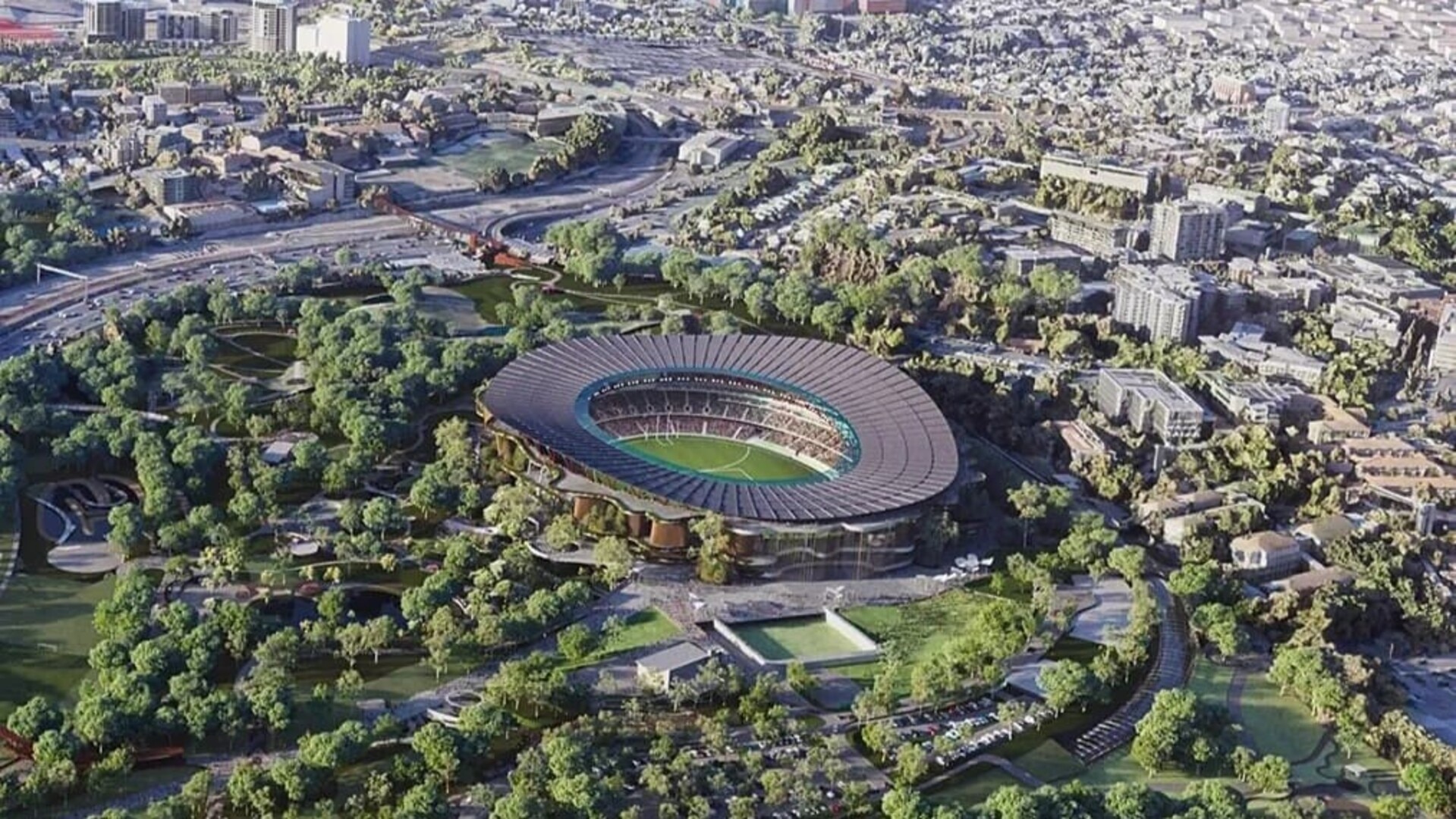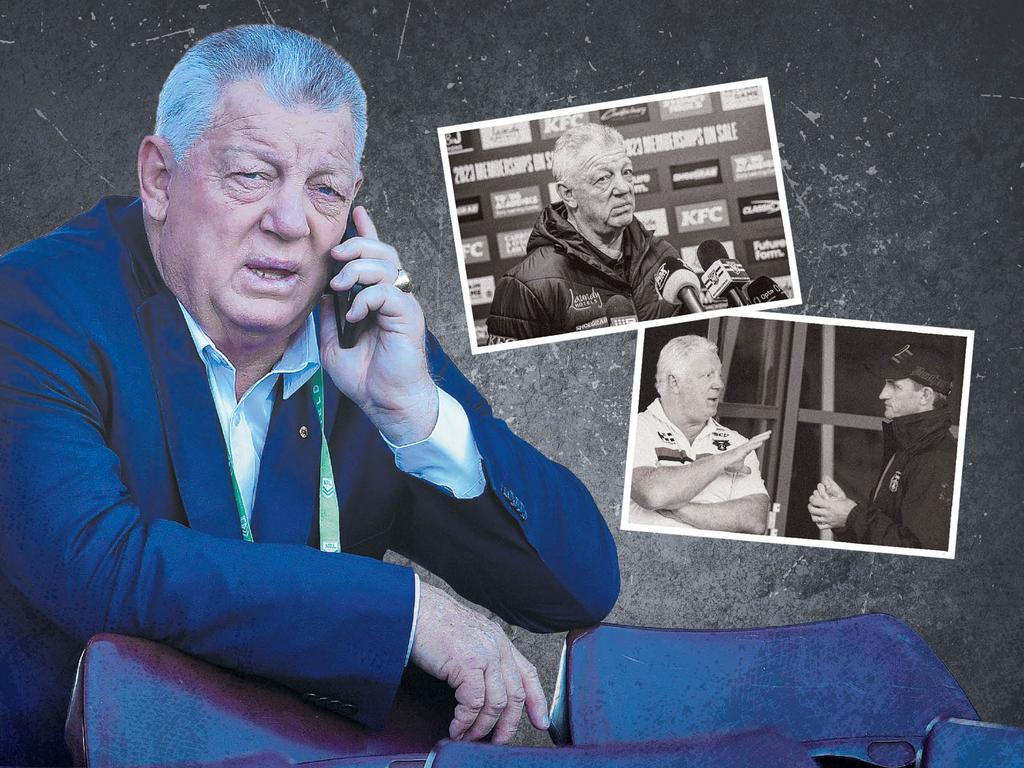
Or is it?
Reports this week that Israel Folau wants to play for a trans-Tasman invitational team against the British and Irish Lions at Adelaide Oval in July barely registered with the rah-rah mothership. Regardless of whether you believe he had the right to post religious-motivated memes on his social media account, the fact remains he said he wouldn’t, then he did, causing years of heartache for the code, including his Wallabies teammates.
Three years ago, he pledged his allegiance to Tonga, meaning he’ll need a special clearance to play in a team reserved for eligible Australian and New Zealand players.
Excuse RA for not rushing to sort this out. It can finally see the sun popping up on the horizon: a new broadcast deal, the announcement of the next Wallabies coach, and a sold-out tour that will fill the cash-strapped code’s coffers again.
Another Folau circus is the last thing it needs.
Arbib in box seat for Olympic top job
Former Labor powerbroker Mark Arbib has emerged as the frontrunner to become the face of the Australian Olympic Committee.
While it’s foolish to presume how the AOC board – which Arbib joined in 2016 – will vote when it decides on a replacement for chief executive Matt Carroll early next week, Arbib appears to be in the box seat.

Arbib did not return calls or text messages when contacted on Friday.
The process to replace Carroll has been shrouded in secrecy although several people have been linked to the role, including former Cricket Australia boss Nick Hockley and Commonwealth Games Australia president Ben Houston.
But Arbib has been the name on most lips inside and outside the AOC in recent weeks.
He has a powerful ally in former IOC vice-president John Coates, who oversaw his ascension to the AOC executive nine years ago.
In many respects, he’s almost too qualified for the job with a wealth of experience in sports administration, including his time as federal sports minister under prime ministers Kevin Rudd and Julia Gillard.

After getting out of politics, he became billionaire James Packer’s fixer-in-chief at Consolidated Press Holdings and was his eyes and ears on the board of NRL powerhouse South Sydney, of which Packer is a part-owner.
Arbib also spent six years as Athletics Australia president.
He’s the definitive numbers man, a distinct advantage when dealing with IOC politics at the top end and minnow sporting bodies at the bottom.
More than anything, Arbib would bring profile to the role, which will be essential as the countdown to the 2032 Brisbane Olympics cranks up.
Hold the self-praise

The Queensland government’s announcement on Tuesday of its extravagant plan for the Brisbane Games was equally entertaining as it was strange.
After Deputy Premier and Infrastructure Minister Jarrod Bleijie played the role of WWE hype man to kick off proceedings, a dazzling array of artist impressions, graphics, and maps revealed the state’s sporting cathedrals of the future.
Premier David Crisafulli then strode to the stage to tell us what a fine job his government had done in bringing this plan together.
If you didn’t know any better, you’d have thought the stadiums had already been built.
Maybe hold off on the self-aggrandising until work is completed on time and within budget. This already feel like an Olympics for Queensland not the country or world. Perhaps Wally Lewis will light the flame flicking a Winfield Blue into the cauldron.

Swimming Australia was the big winner with a $650m National Aquatic Centre to be built at Spring Hill. Officials thought as late as Sunday that a drop-in pool at the Brisbane Live Arena near the Gabba would be the preferred venue for their events.
Other sports are furious about being kept in the dark on their venues. There are already concerns the IOC and World Rowing will rule out Rockhampton’s Fitzroy River for the rowing events.
Sea Eagles plucked

When Manly captain Daly Cherry-Evans in 2015 backflipped on a deal to join the Gold Coast Titans, he squeezed more money and an eight-year contract out of his club.
There was plenty of tut-tutting about Cherry-Evans’ ethics, but he was working well within the rules that allowed players to back out of new contracts before round 13.
“I definitely left the door open for this speculation to continue because, to be honest, I was always curious to know what offer was going to be on the table from Manly,” he said at a media conference.
When he told Channel 9’s 100% Footy on Monday night he wouldn’t be playing at the Sea Eagles next year, prompting Sea Eagles boss Tony Mestrov to inexplicably table a two-year deal live on Fox Sports’ NRL 360 soon after, you couldn’t help but feel he was leaving the door open again.
This time, he’s making the most of the NRL’s mind-numbing rule that allows players to negotiate with other clubs in the final year of their contract.
Whether stirring up the market was Cherry-Evans’ motive is a matter of him, but his very public declaration he was a free agent with a “burning ambition” to keep playing has fired up the player market again.
Because that’s what rugby league needs: more endless speculation about a player’s future. Well, several players’ futures.
Parramatta five-eighth Dylan Brown must be relieved the focus has shifted away from him – he’s already struggling with the pressure of his $13m contract at Newcastle.
“It does nothing for the game, does nothing for the club and it’s wrong and I wish we’d fix it,” South Sydney coach Wayne Bennett said of the NRL’s contracting system. “Aussie rules: this doesn’t happen in their game. They’re our major competitor.
“We’ve hit the self-destruct button four weeks into a football season which has already provided some great football.”
Bennett advocates transfer windows, which the NRL also wants. With no draft in place, it makes sense even if it won’t eliminate talk about player movements.
About the only stakeholders who are comfortable with the current system are player managers and the Rugby League Players Association, which stood in the way of change during never-ending collective bargaining agreement negotiations in 2022.
The NRL excluded transfer windows from their final offer, just to get a deal done.
“We all know a shift in contracting dates will not solve many, if any, perceived issues,” RLPA boss Clint Newton told me. “Therefore, we are not willing to be party to a change that not only doesn’t guarantee fixing some of the hotly debated challenges but is worse for players by restricting their rights to secure a future at a time that’s often best for all parties through certainty rather than ongoing speculation.”
Newton is doing what’s best for the players and that’s fair enough, but let’s get serious: the current system favours the best players because it gives them time to leverage the best deal.
Consequently, it puts even more power in the hands of player managers, who increasingly hold clubs to ransom, while clubs are thrown into disarray and fans are left feeling like soulless shells, wondering about the point of it all.
The system might be flawed, but it doesn’t explain the Sea Eagles’ ineptitude in allowing their 36-year-old captain, who is playing the house down, walk out the door at season’s end.
Cherry-Evans says he isn’t trying to play the field. He also says he isn’t cranky with the Sea Eagles for taking so long to table a legitimate offer.
Yet Mestrov and coach Anthony Seibold should have made him an offer he couldn’t refuse straight after last year’s State of Origin series.
There’s plenty of mud-slinging going on behind the scenes between both parties, but whichever way you look at it, it’s clear Manly have stuffed this up.
Gai abandon

Australian Turf Club members won’t vote next week on the controversial $5 billion proposal to sell off Rosehill Gardens racecourse in Sydney’s west.
The vote was slated for next Thursday, but some members argue they have insufficient information to make an informed decision – mostly because there’s no clarity about where a replacement track will be built.
One person who won’t be voting for the sale is leading trainer Gai Waterhouse, who has repeatedly slammed the idea.
When an interview with Sky Thoroughbred Central scheduled to run in the lead-up to last week’s Golden Slipper was pulled, most believed her comments about Rosehill or criticism of Racing NSW were the reasons.
The legendary trainer hinted as much to Nine Newspapers, claiming it would be unfortunate “if you are not free to speak your mind in Australia”.
Various sources at Sky Racing have confirmed to me that some of Waterhouse’s remarks about Racing NSW were edited out for legal reasons, but that wasn’t the reason the program didn’t air.
Rather, the interview had little to do with the Golden Slipper so it was decided to delay the airing until next week in the lead-up to the TJ Smith Stakes on the first day of The Championships at Royal Randwick.
Bad bunny

The last thing Prime Minister Anthony Albanese expected the day before the handing down of the federal budget were questions about South Sydney mascot Reggie the Rabbit shoving a nine-year-old Cronulla supporter the day before with his hand, er, paw.
Albo’s peeps had to phone Souths chief executive Blake Solly to be briefed on the rascally wabbit, who is played by 81-year-old Charlie Gallico.
After telling Nine and Ten that he had been provoked, Gallico performed a dramatic about-face and apologised.







To Folau or not to Folau: that is the question again for Rugby Australia.